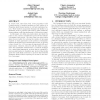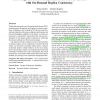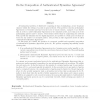148 search results - page 6 / 30 » Self-stabilization of Byzantine Protocols |
PODC
2012
ACM
12 years 7 days ago
2012
ACM
In recent years, there have been a few proposals to add a small amount of trusted hardware at each replica in a Byzantine fault tolerant system to cut back replication factors. Th...
CORR
2010
Springer
13 years 10 months ago
2010
Springer
Self-stabilization is a versatile approach to fault-tolerance since it permits a distributed system to recover from any transient fault that arbitrarily corrupts the contents of a...
EUROSYS
2011
ACM
13 years 1 months ago
2011
ACM
Traditional agreement-based Byzantine fault-tolerant (BFT) systems process all requests on all replicas to ensure consistency. In addition to the overhead for BFT protocol and sta...
SODA
2008
ACM
13 years 11 months ago
2008
ACM
We resolve two long-standing open problems in distributed computation by describing polylogarithmic protocols for Byzantine agreement and leader election in the asynchronous full ...
STOC
2002
ACM
14 years 10 months ago
2002
ACM
A fundamental problem of distributed computing is that of simulating a secure broadcast channel, within the setting of a point-to-point network. This problem is known as Byzantine...



